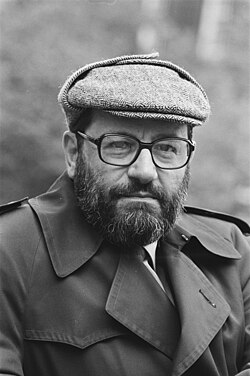Umberto Eco Quote
Related Quotes
To begin to know ourselves we must have sincere conversations with ourselves as if with a good friend. We must answer without reserve, listen without judgement, and accept without condition. That is s...
Kamand Kojouri
Tags:
accept, acceptance, answer, ask, begin, better, betterment, compassion, compassionate, condition
I'm afraid to go out at night because it's too dark.I'm afraid to try different food because I may not like it.I'm afraid to do something different because what if I fail.I'm afraid to smile at someon...
Anthony T. Hincks
Tags:
afraid, because, committed, crazy, different, everyone, friend, friends, frightened, philosophy
Amanda, you finally decided to answer the phone, her mom exclaimed after picking up at the first ring. Where’ve you been, what’ve you been up to?Mom, do you remember when I was a kid, I had a friend,...
Rebecca McNutt
Tags:
call, canada, cape breton, conversation, dysfunctional families, eighteen, family, friend, friendship, girl
Some of the most evil human beings in the world are psychiatrists. Not all psychiatrists. Some psychiatrists are selfless, caring people who really want to help. But the sad truth is that in today's s...
Rebecca McNutt
Tags:
asocial, child innocence, childhood, colleague, creepy, crime, disorder, drug company, drugs, ethics
About Umberto Eco
Umberto Eco (5 January 1932 – 19 February 2016) was an Italian medievalist, philosopher, semiotician, novelist, cultural critic, and political and social commentator. In English, he is best known for his popular 1980 novel The Name of the Rose, a historical mystery combining semiotics in fiction with biblical analysis, medieval studies and literary theory, as well as Foucault's Pendulum, his 1988 novel which touches on similar themes.
Eco wrote prolifically throughout his life, with his output including children's books, translations from French and English, in addition to a twice-monthly newspaper column "La Bustina di Minerva" (Minerva's Matchbook) in the magazine L'Espresso beginning in 1985, with his last column (a critical appraisal of the Romantic paintings of Francesco Hayez) appearing 27 January 2016. At the time of his death, he was an Emeritus professor at the University of Bologna, where he taught for much of his life. In the 21st century, he has continued to gain recognition for his 1995 essay "Ur-Fascism", where Eco lists fourteen general properties he believes comprise fascist ideologies.
Eco wrote prolifically throughout his life, with his output including children's books, translations from French and English, in addition to a twice-monthly newspaper column "La Bustina di Minerva" (Minerva's Matchbook) in the magazine L'Espresso beginning in 1985, with his last column (a critical appraisal of the Romantic paintings of Francesco Hayez) appearing 27 January 2016. At the time of his death, he was an Emeritus professor at the University of Bologna, where he taught for much of his life. In the 21st century, he has continued to gain recognition for his 1995 essay "Ur-Fascism", where Eco lists fourteen general properties he believes comprise fascist ideologies.
